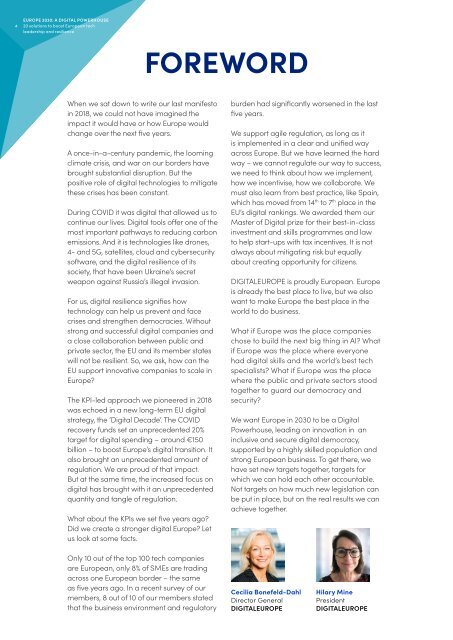DIGITALEUROPE - EUROPE 2030 A DIGITAL POWERHOUSE FINAL WEB_PBP
You also want an ePaper? Increase the reach of your titles
YUMPU automatically turns print PDFs into web optimized ePapers that Google loves.
4<br />
<strong>EUROPE</strong> <strong>2030</strong>: A <strong>DIGITAL</strong> <strong>POWERHOUSE</strong><br />
20 solutions to boost European tech<br />
leadership and resilience<br />
FOREWORD<br />
When we sat down to write our last manifesto<br />
in 2018, we could not have imagined the<br />
impact it would have or how Europe would<br />
change over the next five years.<br />
A once-in-a-century pandemic, the looming<br />
climate crisis, and war on our borders have<br />
brought substantial disruption. But the<br />
positive role of digital technologies to mitigate<br />
these crises has been constant.<br />
During COVID it was digital that allowed us to<br />
continue our lives. Digital tools offer one of the<br />
most important pathways to reducing carbon<br />
emissions. And it is technologies like drones,<br />
4- and 5G, satellites, cloud and cybersecurity<br />
software, and the digital resilience of its<br />
society, that have been Ukraine’s secret<br />
weapon against Russia’s illegal invasion.<br />
For us, digital resilience signifies how<br />
technology can help us prevent and face<br />
crises and strengthen democracies. Without<br />
strong and successful digital companies and<br />
a close collaboration between public and<br />
private sector, the EU and its member states<br />
will not be resilient. So, we ask, how can the<br />
EU support innovative companies to scale in<br />
Europe?<br />
The KPI-led approach we pioneered in 2018<br />
was echoed in a new long-term EU digital<br />
strategy, the ‘Digital Decade’. The COVID<br />
recovery funds set an unprecedented 20%<br />
target for digital spending – around €150<br />
billion – to boost Europe’s digital transition. It<br />
also brought an unprecedented amount of<br />
regulation. We are proud of that impact.<br />
But at the same time, the increased focus on<br />
digital has brought with it an unprecedented<br />
quantity and tangle of regulation.<br />
What about the KPIs we set five years ago?<br />
Did we create a stronger digital Europe? Let<br />
us look at some facts.<br />
burden had significantly worsened in the last<br />
five years.<br />
We support agile regulation, as long as it<br />
is implemented in a clear and unified way<br />
across Europe. But we have learned the hard<br />
way – we cannot regulate our way to success,<br />
we need to think about how we implement,<br />
how we incentivise, how we collaborate. We<br />
must also learn from best practice, like Spain,<br />
which has moved from 14 th to 7 th place in the<br />
EU’s digital rankings. We awarded them our<br />
Master of Digital prize for their best-in-class<br />
investment and skills programmes and law<br />
to help start-ups with tax incentives. It is not<br />
always about mitigating risk but equally<br />
about creating opportunity for citizens.<br />
<strong><strong>DIGITAL</strong><strong>EUROPE</strong></strong> is proudly European. Europe<br />
is already the best place to live, but we also<br />
want to make Europe the best place in the<br />
world to do business.<br />
What if Europe was the place companies<br />
chose to build the next big thing in AI? What<br />
if Europe was the place where everyone<br />
had digital skills and the world’s best tech<br />
specialists? What if Europe was the place<br />
where the public and private sectors stood<br />
together to guard our democracy and<br />
security?<br />
We want Europe in <strong>2030</strong> to be a Digital<br />
Powerhouse, leading on innovation in an<br />
inclusive and secure digital democracy,<br />
supported by a highly skilled population and<br />
strong European business. To get there, we<br />
have set new targets together, targets for<br />
which we can hold each other accountable.<br />
Not targets on how much new legislation can<br />
be put in place, but on the real results we can<br />
achieve together.<br />
Only 10 out of the top 100 tech companies<br />
are European, only 8% of SMEs are trading<br />
across one European border – the same<br />
as five years ago. In a recent survey of our<br />
members, 8 out of 10 of our members stated<br />
that the business environment and regulatory<br />
Cecilia Bonefeld-Dahl<br />
Director General<br />
<strong><strong>DIGITAL</strong><strong>EUROPE</strong></strong><br />
Hilary Mine<br />
President<br />
<strong><strong>DIGITAL</strong><strong>EUROPE</strong></strong>



